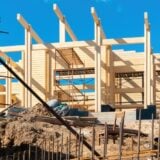After months of increasingly dire warnings the second larges mall operator with 200 malls in 44 states, admitted its debts total $27 billion and its attempts to persuade investors who own more than $2.25 billion of its bonds to waive payments this year had not succeeded.
'The credit market effectively ended in October for companies like ours,' said Thomas H. Nolan Junior, General Growth's president and chief operating officer. Its malls will continue to operate and the company is unlikely to face liquidation.
The company began 55 years ago when Martin and Matthew Bucksbaum built one of the nation's first shopping centres, in Cedar Rapids, Iowa. Soon they built another, and another, and another, transforming their family company into a colossus of the American mall.
Analysts are warning that it is a harbinger of the troubles to come in the commercial property market as the recession drags on in the US.
While General Growth's bankruptcy was widely expected within the industry, it is seen as a sign of what many see as a looming crisis in commercial real estate. Companies are struggling to pay their debts.
Analysts estimate that the commercial real estate industry has about $264 billion in debt scheduled to mature this year, and $273 billion in 2010.
Nolan said that the company is hoping to exit bankruptcy in about a year. During that time General Growth will look to extend the maturities of its mortgages and reduce its debt. It may do so by bringing in new capital or converting some of its debt into equity.
A less palatable option is selling some of the company's properties, he said.
But General Growth has already tried that approach with little success, as the dismal credit markets restrict what potential buyers can borrow to finance their purchases. Several of General Growth's malls are also underwater, with their debt now greater than their equity.
The bankruptcy is likely to have a major impact on mall values. No major mall transactions have occurred in more than a year, making it impossible to estimate how much value they have lost. But the sale of the General Growth assets will provide a benchmark, according to Keven Lindemann, director of real estate for SNL Financial, a research company in Charlottesville.





